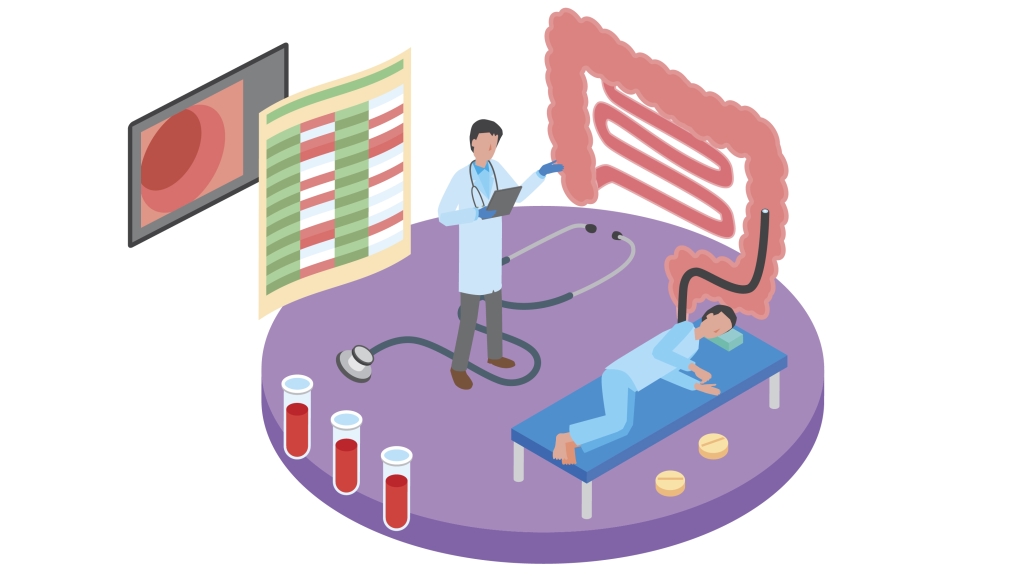Even if removing the cost barrier only moves the needle a little, it will save money and years of life for people with both Medicare and private insurance
5:00 AM
Author |

Ever since the start of 2023, most Americans over age 45 have had a new health insurance benefit: the ability to get a follow up colonoscopy at no cost to them, if a test of their stool suggests signs of potential colorectal cancer.
This coverage from both Medicare and private insurance, required by law, seeks to encourage more people to get screened in the first place, by starting with a stool test if they prefer.
But it also seeks to increase the percentage of people who follow up on a troubling result, by keeping out-of-pocket costs from getting in the way.
Before this provision took effect, nearly half of people in the eligible group of people age 45 to 75 didn’t get any sort of colorectal cancer screening – whether through a stool sample test or a colonoscopy.
That’s even though the initial screening hasn’t cost eligible patients anything for more than a decade.
And nearly half of those who did get screened via a stool test, and had signs of trouble, didn’t go for a follow up colonoscopy to look for signs of cancer and remove potentially cancerous polyps.
The rates of screening tended to be lower, and lack of follow up higher, among people with lower incomes and people of color.
Now, a pair of studies suggests that the benefit will save people money and potentially extend their lives through early detection and treatment – but it will also lead to financial savings for both Medicare and private insurers, even though they’ll be paying for more people to receive both initial screening tests and follow up colonoscopies when needed.
That’s true even if the removal of the follow up cost barrier only leads to small gains in the number of people getting screening colonoscopies or stool-based screening tests with follow up colonoscopies.
The findings are published in the journal Cancer Research Communications and the journal Population Health Management by a team led by A. Mark Fendrick, M.D., director of the University of Michigan Center for Value Based Insurance Design.
"These findings estimating that those who undergo follow up colonoscopy have better colorectal cancer-related outcomes and lower total medical expenditures, compared with those who don’t undergo follow up, should compel stakeholders to further invest in patient education, navigation, transportation, and other support services that facilitate completion of the colorectal cancer screening process," said Fendrick, a professor of internal medicine at the U-M Medical School and member of the Institute for Healthcare Policy and Innovation.
SEE ALSO: Follow up costs can add up if a free cancer screening shows a potential problem
The larger the percentage increase in screening, follow up, or both, the more the savings for individuals and the Medicare system, the researchers find.
But even a 5% increase in both behaviors will have this effect.
Medicare will save more than $4,700, and private insurance will save as much as $6,400, in the lifetime costs for every patient who gets a follow up colonoscopy after a positive stool test, the research shows.
That’s even though each follow up colonoscopy costs private insurance more than $2,000 and Medicare more than $1,100.
The studies were funded by, and Fendrick is a consultant to, a company called Exact Sciences, which makes a specific type of stool-based screening test. Several of the authors are employees of the company. The funding arrangement ensured the authors’ independence in performing the research.
The studies used a validated modeling tool originally developed by the company using National Cancer Institute tools and data.
The study also modeled the potential impact of increasing colonoscopy and use of another type of stool-based screening test called FIT, which does not involve the company’s product.
“Given the strong evidence that patient outcomes are improved, and new data suggesting that completion of follow up colonoscopy can be cost-saving, navigation issues such as education, transportation and time off of work must be addressed, as well as the need to ensure adequate and equitable access to follow up colonoscopy,” added co-author David Lieberman, M.D., professor of medicine at the Oregon Health and Science University.
SEE ALSO: Cancer screenings have saved the U.S. at least $6.5 trillion
Screening colonoscopies and stool-based screening tests have been available at no cost to Medicare participants and to people with private insurance who meet current age criteria since the Affordable Care Act’s preventive services coverage took effect in 2011.
A federal regulation requiring coverage of follow up colonoscopy without consumer cost sharing was implemented for Medicare and commercial insurers in 2023.
Fendrick and colleagues’ previous work documenting the out-of-pocket costs of follow up colonoscopy paid by Medicare beneficiaries and commercially insured individuals helped inform the rule change from the Centers for Medicare and Medicaid Services that led to the new benefit that took effect this year.
Papers cited:
“Impact of Eliminating Cost-Sharing by Medicare Beneficiaries for Follow Up Colonoscopy After a Positive Stool-based Colorectal Cancer Screening Test,” Cancer Research Communications. DOI: 10.1158/2767-9764.CRC-23-0322
A Call to Action to Increase Uptake of Follow Up Colonoscopy After Initial Positive Stool-Based Colorectal Cancer Screening, Population Health Management. DOI:10.1089/pop.2023.0199

Explore a variety of healthcare news & stories by visiting the Health Lab home page for more articles.

Department of Communication at Michigan Medicine
Want top health & research news weekly? Sign up for Health Lab’s newsletters today!





